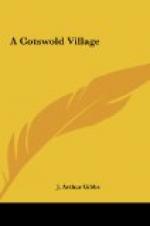It is very surprising that there is not more demand for country houses in England when one considers that an extensive demesne may be rented at a price which is paid for a small flat in unfashionable Kensington. The local term in Gloucestershire for renting a manor is “holding the liberty”—the old Saxon word. The term is singularly expressive of the freedom possessed by the man who exchanges the life of the town or the villa for a manor in one of the remote counties. He who enjoys the sporting rights, with license (as the leases run) to hunt, fish, course, hawk, or sport without the labour and loss of farming the land, possesses all the pleasures of the squire’s existence with few of its drawbacks and responsibilities. Yet many a fine old house in the country remains unlet because the life is considered a dull one by those who have not been brought up to it. With nature’s book spread so amply before our eyes, the country is never dull. At no time of life is it too late to commence the study of this book of nature. The faculty of observation is one that is easily acquired. It is not a case of nascitur non fit. With tolerably good eyesight and a determination to learn, a man soon
“Finds tongues
in trees, books in the running brooks,
Sermons in stones,
and good in everything.”
And the habit of observing once acquired, we can never lose it till we die.
Of course those who rent a place in preference to purchasing it miss one of the greatest and most useful privileges the country can confer—that of following in the footsteps of him who
“Strove for sixty
widow’d years to help his homelier brother
man,
Served the poor
and built the cottage, rais’d the school
and
drained the fen.”
These are the true delights of a country existence; and it is, I think, incumbent on the really rich men of England, if they have the welfare of the nation at heart, to hold a stake, however small, in the land, even at a sacrifice of income. I refer to men with incomes ranging from ten to a hundred thousand pounds per annum, who would not feel the loss of interest that would possibly accrue on an exchange of investment from “the elegant simplicity of the three per cents.” to an agricultural estate in the country. They may be giving gold for silver in the transaction, but will be amply repaid in a thousand different ways. How infinitely preferable the existence of the poor countryman, even though times be hard, to that of the misguided being of whom it may be said:




